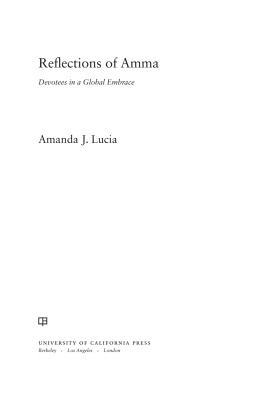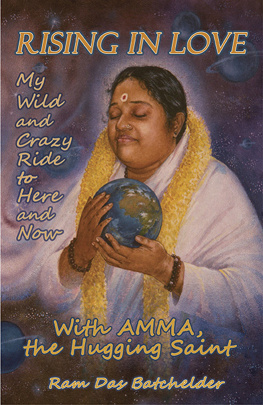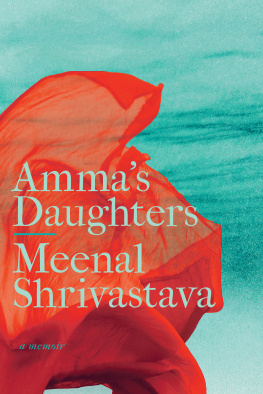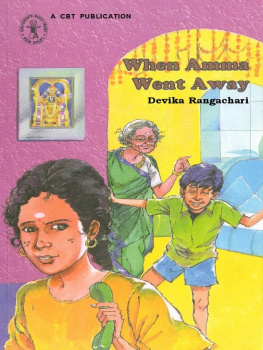
Reflections of Amma
Reflections of Amma
Devotees in a Global Embrace
Amanda J. Lucia

UNIVERSITY OF CALIFORNIA PRESS
BerkeleyLos AngelesLondon
University of California Press, one of the most distinguished university presses in the United States, enriches lives around the world by advancing scholarship in the humanities, social sciences, and natural sciences. Its activities are supported by the UC Press Foundation and by philanthropic contributions from individuals and institutions. For more information, visit www.ucpress.edu.
University of California Press
Berkeley and Los Angeles, California
University of California Press, Ltd.
London, England
2014 by The Regents of the University of California
Cataloging-in-Publication data is on the file with the Library of Congress.
ISBN 978-0-520-28113-4 (cloth : alk. paper)
ISBN 978-0-520-28114-1 (pbk. : alk. paper)
eISBN 9780520958074
Manufactured in the United States of America
22212019181716151413
10987654321
In keeping with a commitment to support environmentally responsible and sustainable printing practices, UC Press has printed this book on Natures Natural, a fiber that contains 30% post-consumer waste and meets the minimum requirements of ANSI / NISO Z 39.48-1992 ( R 1997)( Permanence of Paper ).
For Jonas and Zoe, whose hugs keep everything in perspective
Contents
Illustrations
Acknowledgments
In 2006 I asked Amma directly if I might have her blessing to write my dissertation on her and her movement. Amma seemed surprised and playfully amused at first, and then with seriousness she said yes and encouraged me to read all of the books at the bookstore in the back of the darshan hall. She then gave me a special sandalwood k with the ring finger of her right hand and her classic darshan embrace. Without this gracious blessing, I would have been in a dilemma. While receiving Ammas blessing for my academic project would not have been of consequence to many scholars (and for some it may even function detrimentally), for devotees it was all that mattered. Ammas blessing became a virtual passport that I carried with me throughout my fieldwork, and for that I am most grateful.
Devotees invited me into their homes and their lives, embracing me as friend, sister, auntie, and niece. I was consistently overwhelmed by the warmhearted kindness of Balan, Lakshmi, Vinita, and Krishna, Molly and Suresh, Manju and Praveen, Preet and Raman, Dhananjay and Dhanashree, Jay and Sunitha, Latha and Harish, Pradeep and Reena, Santosh and Bindu, Saveen and Sindhu, Milind and Meetali, Gulbinder and Vinoo, Viji and Ramesh, Gangadhar and Madhusmita, Kasi and Annam, Raj and Sudha, Alok and Lorena, Beena, Madhu, Mridula and Sethu, and AYUDH (Ammas youth group). Each taught me the meaning of satsang family. Puneeta, Jayan, Eric, Gail, Hanuman, Shakti Prasad, Barbara, Tanushree, Radha, Stevik, Kalavati, and Aaron were exceptionally welcoming and taught me how to sing without shyness in small groups of my peers. In later years I was consistently buttressed by meaningful conversations with earnest devotees, too many to name here, but I especially would like to thank Priya, Ron, Temba, Nirmalan, Mithilesh, Renuka, Kathy and Linda, Lina, C. C., Shiva Rae, Sridhar, Harsha, Rema Devi, Venilla, Neelima, Jodi, and Ammas tour staff. I am so thankful for the dozens of anonymous devotees who often shared their most intimate feelings with a stranger with openness, patience, and loving kindness. I also owe a sincere debt of gratitude to the ashram staff at Amritapuri and in San Ramon, in particular, Janani and Sachin for their advice, guidance, and patient assistance with illustration permissions. Last, I am most grateful for the assistance of Swami Amritaswarupananda Puri, Swami Ramakrishnananda Puri, Br. Shantamrita, and, most significantly, Br. Dayamrita Chaitanya, who graciously provided interviews and logistical support.
In my earliest days of fieldwork, I tacked between devotional communities in the Chicago suburbs and my academic home at the University of Chicago, where I relied on a wealth of expertise and support for my research. Of those who were at the University of Chicago at that time, I am indebted to Malika Zeghal, Catherine Brekus, Christian Wedemeyer, Bruce Lincoln, Tanika Sarkar, Martin Riesebrodt, Dipesh Chakrabarty, Rochona Majumdar, and Omar McRoberts, all of whom offered significant suggestions and intellectual adjustments to my thinking. Steven Collins raised poignant questions over many long lunches and coffees, for which I only now realize what a privilege that time was. Similarly, Wendy Doniger has always shown unflagging support and her own intellectual style of maternal care in pedagogy, letting me run free and tightening the reins with impeccable pacing and only as needed, as any good horse woman would.
Before and after Chicago, I have been fortunate to be surrounded by intellectual excellence in my colleagues, friends, and mentors, who have all provided insights that I have incorporated into the text in various forms. I would like to thank, in particular, David Haberman, Rebecca Manring, James Hart, Pamela Winfield, Ron Mourad, Todd Penner, Hugh Urban, Deepak Sarma, Peter Gottschalk, Hanna Kim, John Nemec, David Shulman, Laurie Patton, Purushottama Bilimoria, Sheldon Pollock, and Joanne Punzo Waghorne. At the University of California, Riverside (UCR), I have gratefully accepted intellectual support from and stimulating conversations with my colleagues, in particular, Vivian Nyitray, Pashaura Singh, and Ivan Strenski. I also have benefited immensely from discussions that took place at the Institute for the Study of Immigration and Religion at UCR and with my codirectors, Jennifer Hughes and Michael Alexander. My cohorts and friends continue to assist me in developing my thoughts; particular thanks go to Jen Sandler, Romi Mukherjee, Lucas Carmichael, Benjamin Schonthal, and Jeremy Morse.
This book has benefited greatly from audience responses at the American Academy of Religions (2012), the Society for the Anthropology of Religion (2011), the University of Wisconsin, Madison, South Asia Conference (2010), and the American Anthropological Association (2009). In addition, invited presentations at the University of Chicagos conference Hindus in India and America (2010), the Art Institute of Chicago (2011), and Asia Week at Austin College (2011) helped formulate my thoughts on Swami Vivekananda. Thoughtful engagement with students at University of California, Riverside has improved the manuscript, specifically in response to my graduate seminar on the North American encounter with religious Others and my undergraduate course Gurus and Saints, wherein students raised intelligent questions that pushed my own work further. I am grateful to Jessica Rehman for her logistical assistance with final edits to the manuscript. The two anonymous reviewers at the University of California Press provided excellent suggestions and careful commentary that made this book a much better one; I thank them deeply for their very hard work. I am wholly grateful for the staff at the University of California Press, particularly Lissa Caldwell, Stacy Eisenstark, Michele Lansing, and Reed Malcolm, who supported me throughout the publication process with vision and smart professionalism. Of course, despite such insightful interventions and careful commentary, I am wholly accountable for that which is presented herein.
In addition, I benefited from the financial support of the Divinity School and the Committee on South Asian Studies at the University of Chicago, the American Institute of Indian Studies, the Foreign Language and Area Studies Program, and a UCR faculty research grant. Furthermore, I am deeply indebted to my friends and family whose personal connections enabled me to complete my fieldwork. Debra Bernard graciously loaned me her house and her car so that I could conduct my research at the San Ramon ashram. Mark Singleton offered to drive me out to the Santa Fe ashram, and countless others facilitated my research in wonderful and practical ways. I am also grateful to Ramu Pandit and Max Katz, who first recounted their stories of Amma and encouraged me to look into her movement in more detail.
Next page









